

The Telephone Call Summary & Analysis by Fleur Adcock
- Line-by-Line Explanation & Analysis
- Poetic Devices
- Vocabulary & References
- Form, Meter, & Rhyme Scheme
- Line-by-Line Explanations
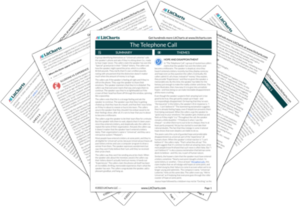
"The Telephone Call" appears in Fleur Adcock's collection The Incident Book (1986). It describes a mysterious phone call from "Universal Lotteries," an organization claiming that the speaker has won their grand prize. When the callers finally admit the speaker hasn't won any money, they claim the true "prize" was the memorable "experience" of the call itself. The poem can be read as a miniature fable about ordinary disappointment, suggesting that human experience always falls short of our wildest hopes. Metaphorically speaking, we never win the lottery; at best, we get to entertain the fantasy for a while.
- Read the full text of “The Telephone Call”
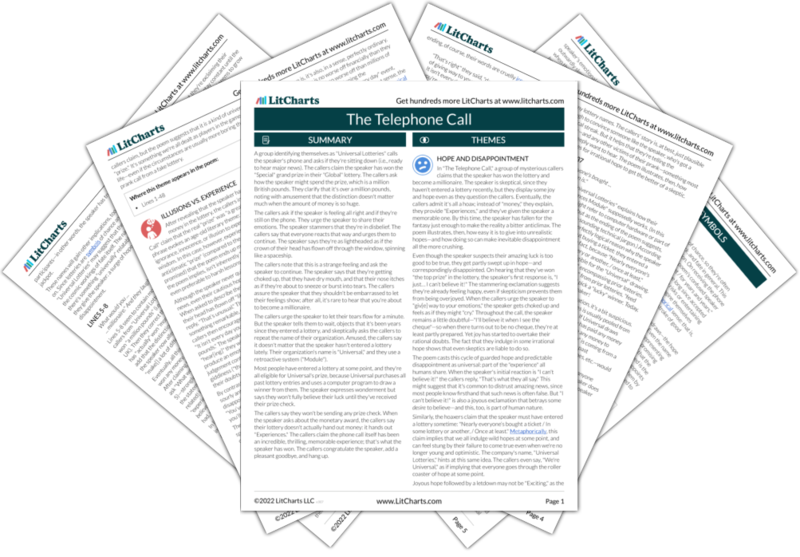
The Full Text of “The Telephone Call”
“the telephone call” summary, “the telephone call” themes.

Hope and Disappointment
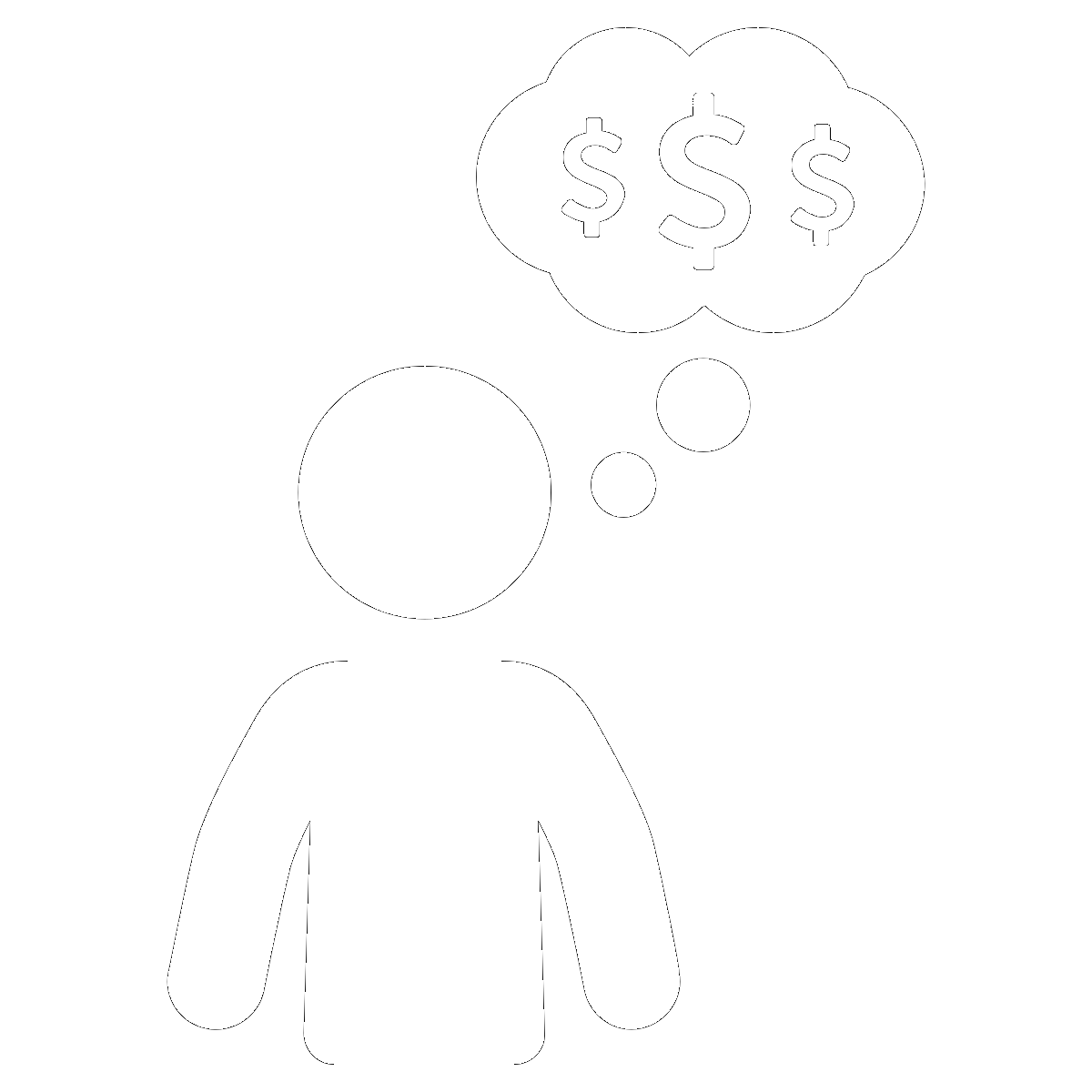
Illusions vs. Experience
Line-by-line explanation & analysis of “the telephone call”.
They asked me ... ... Ultra-Super Global Special.

What would you ... ... millionaire." And they laughed.
"Are you OK?" ... ... us about it."
Lines 14-20
I said "I ... ... to sneeze—or cry."
Lines 21-26
"That's right" they ... ... you a moment…"
Lines 26-32
"Hang on!" I said. ... ... retrospective Chances Module.
Lines 33-37
Nearly everyone's bought ... ... lucky person is."
Lines 38-42
"Well, that's incredible" ... ... deal in money.
Lines 43-48
Experiences are what ... ... line went dead.
“The Telephone Call” Symbols

The Lottery
- Lines 2-4: “This is Universal Lotteries," / they said. "You've won the top prize, / the Ultra-Super Global Special.”
- Lines 27-37: “"I haven’t bought a lottery ticket / for years and years. And what did you say / the company’s called?" They laughed again. / "Not to worry about a ticket. / We're Universal. We operate / A retrospective Chances Module. / Nearly everyone's bought a ticket / in some lottery or another, / once at least. We buy up the files, / feed the names into our computer, / and see who the lucky person is."”
- Lines 42-47: “"We don't deal in money. / Experiences are what we deal in. / You've had a great experience, right? / Exciting? Something you’ll remember? / That's your prize. So congratulations / from all of us at Universal.”
“The Telephone Call” Poetic Devices & Figurative Language
- Lines 11-12: “I said "I just… I can't believe it!" / They said "That’s what they all say.”
- Lines 41-48: “"Oh," they said, "there's no cheque." / "But the money?" "We don't deal in money. / Experiences are what we deal in. / You've had a great experience, right? / Exciting? Something you’ll remember? / That's your prize. So congratulations / from all of us at Universal. / Have a nice day!"”
Rhetorical Question
- Lines 44-45: “You've had a great experience, right? / Exciting? Something you’ll remember?”
- Line 2: “Universal Lotteries”
- Line 5: “a million pounds”
- Line 6: “a million”
- Line 8: “millionaire”
- Line 10: “tell us”
- Line 13: “Go on,” “tell us”
- Line 17: “Go on”
- Line 19: “My,” “my”
- Line 20: “cry”
- Line 24: “a million pounds”
- Line 25: “cry”
- Line 26: “I said”
- Line 27: “lottery ticket”
- Line 28: “years,” “years”
- Line 30: “a ticket”
- Line 31: “Universal”
- Line 33: “a ticket”
- Line 34: “lottery”
- Line 38: “I said”
- Line 40: “cheque”
- Line 41: “cheque”
- Line 42: “money,” “money”
- Line 43: “Experiences”
- Line 44: “experience”
- Line 47: “Universal”
- Line 1: “Are you sitting down?”
- Line 11: “I can't believe it!”
- Line 12: “That’s what they all say.”
- Line 23: “It isn't every day”
- Line 25: “have a little cry”
- Line 48: “Have a nice day!”
“The Telephone Call” Vocabulary
Select any word below to get its definition in the context of the poem. The words are listed in the order in which they appear in the poem.
- Universal Lotteries
- The Ultra-Super Global Special
- Flying saucer
- Retrospective
- Chances Module
- (Location in poem: Line 2: “This is Universal Lotteries”; Line 31: “We're Universal.”; Lines 46-47: “So congratulations / from all of us at Universal.”)
Form, Meter, & Rhyme Scheme of “The Telephone Call”
Rhyme scheme, “the telephone call” speaker, “the telephone call” setting, literary and historical context of “the telephone call”, more “the telephone call” resources, external resources.
An Interview with the Poet — Listen to an interview with Fleur Adcock about her life and career.
A Profile of the Poet — Read about Adcock at the Postcolonial Studies blog at Emory University.
A Retrospective — Read a retrospective on Adcock's career, published in The Guardian upon the release of her Collected Poems (2000).
The Poet's Life and Work — A brief biography of Adcock from the Poetry Foundation.
More Adcock Resources — A biography, bibliography, and critical perspective on the poet, via the British Council Literature.
LitCharts on Other Poems by Fleur Adcock
For Heidi With Blue Hair
Ask LitCharts AI: The answer to your questions

The Telephone Call Questions & Answers
Hi Everyone!! This article will share The Telephone Call Questions & Answers. In my previous posts, I have shared the questions and answers of Beautiful Bengal , Quasimodo and Music The Elixir Of Life so, you can check these posts as well.
The Telephone Call Questions & Answers
Question 1: what is the name of the caller’s company.
Answer: The name of the caller’s company is ‘Universal Lotteries’.
Question 2: What news does the caller give?
Answer: The caller gave the news that the speaker has won the top prize in the Ultra-super Global Special.
Question 3: Read and answer the questions:
I said, ‘I just …. I can’t believe it.’
(a) Who says these words to whom?
Answer: The speaker says these words to caller.
(b) What can’t the speaker believe?
Answer: The speaker couldn’t believe when the caller said he has won the lottery.
(c) What is the speaker told in response to his belief?
Answer: In response to this statement, the speaker urged to share his feelings with the caller.
Question 4: What part of the speaker’s reaction to the news was considered ‘unusual’?
Answer: The speaker feeling that his head had floated out of the window like a flying saucer was considered unusual.
Question 5: Pick out the lines that reveal slight doubts in the speaker’s mind about the caller.
Answer: The lines, ‘I haven’t bought lottery ticket for years’ and ‘I’ll believe it when I see the cheque’ show the speaker’s doubt about the caller.
Question 6: Explain the process that the caller says the company uses to select a winner.
Answer: The Company uses a retrospective chances module to select a winner. In other words, they collect the names of the people who bought a lottery ticket once at least and later, they feed the names into computer and select the lucky person.
Question 7: What according to the caller does the company deal in and what does it not deal in?
Answer: The Company deals in experience and it does not deal in money.
Question 8: Read and answer the questions:
‘That’s your prize’.
Answer: The caller said these words to the speaker.
(b) Name the prize supposedly won by the speaker.
Answer: The prize supposedly won by the speaker is million pounds.
(c) What prize did the caller actually receive?
Answer: The prize that the caller actually won is the experience, the joy of receiving an unexpectedly a wonderful news. So, these were The Telephone Call Questions & Answers.
Share this:
- Click to share on Twitter (Opens in new window)
- Click to share on Facebook (Opens in new window)
- Click to share on Pinterest (Opens in new window)
- Click to share on WhatsApp (Opens in new window)
Poetry Prof
Read, Teach, Study Poetry
The Telephone Call
Fleur Adcock reminds us that, in the final reckoning, we’re all winners; we just need to remember to appreciate it.
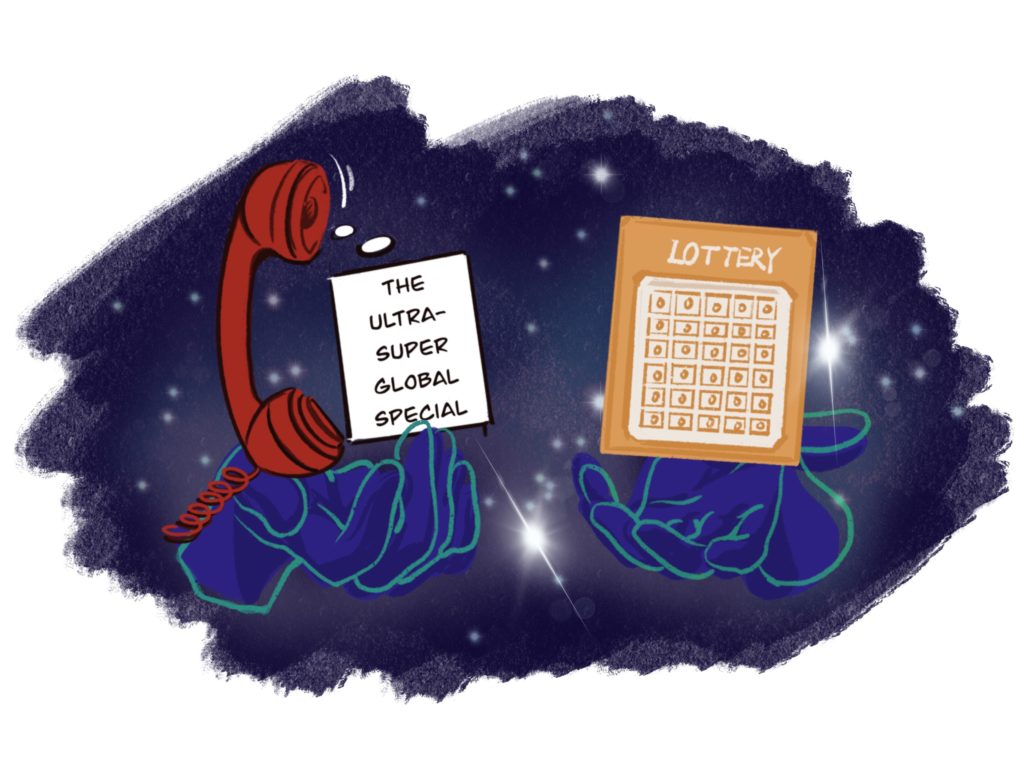
“Such joy and mischief… an enjoyably light approach to potentially heavy subjects…” Emma Neale, Academy of New Zealand Literature.
As the mysterious lottery rep in today’s poem says: Nearly everyone’s bought a ticket in some lottery or another, once at least , whether the prize is a million pounds in a national lottery, a dream house , or just a silly teddy bear at a charity raffle. And, if you’re lucky enough, you may even have had your ticket pulled out of the tombola once or twice. But what if, one day, you won the big one – the accumulator bet, the rollover multi-million jackpot, the Ultra-super Global Special Top Prize ? That’s exactly what happens in Fleur Adcock’s The Telephone Call . An ordinary person is, presumably, just about to sit down for some dinner when the phone rings and, on picking up, she is told she’s won the lottery. But it’s not long before the conversation starts to take a very strange turn and we discover things are not all they seem to be:
The telephone is something of a motif in Fleur Adcock’s poems. In For Heidi with Blue Hair , a phone call connects a strict headmaster, who sends Heidi home from school for dying her hair an unnatural colour, and Heidi’s angry father who argues the case for freedom of expression. It’s easy to think how a telephone can symbolise the idea of communication through the connection between two people who might be physically far apart. But in both Heidi and our poem today, the telephone actually reveals how two people can be connected yet disconnected, talk without understanding. In The Telephone Call , the power dynamic is all wrong: the call arrives unexpectedly, the person who picks up the phone is not ready or prepared for the news she receives, and the caller holds all the power because he knows what the punchline is going to be.
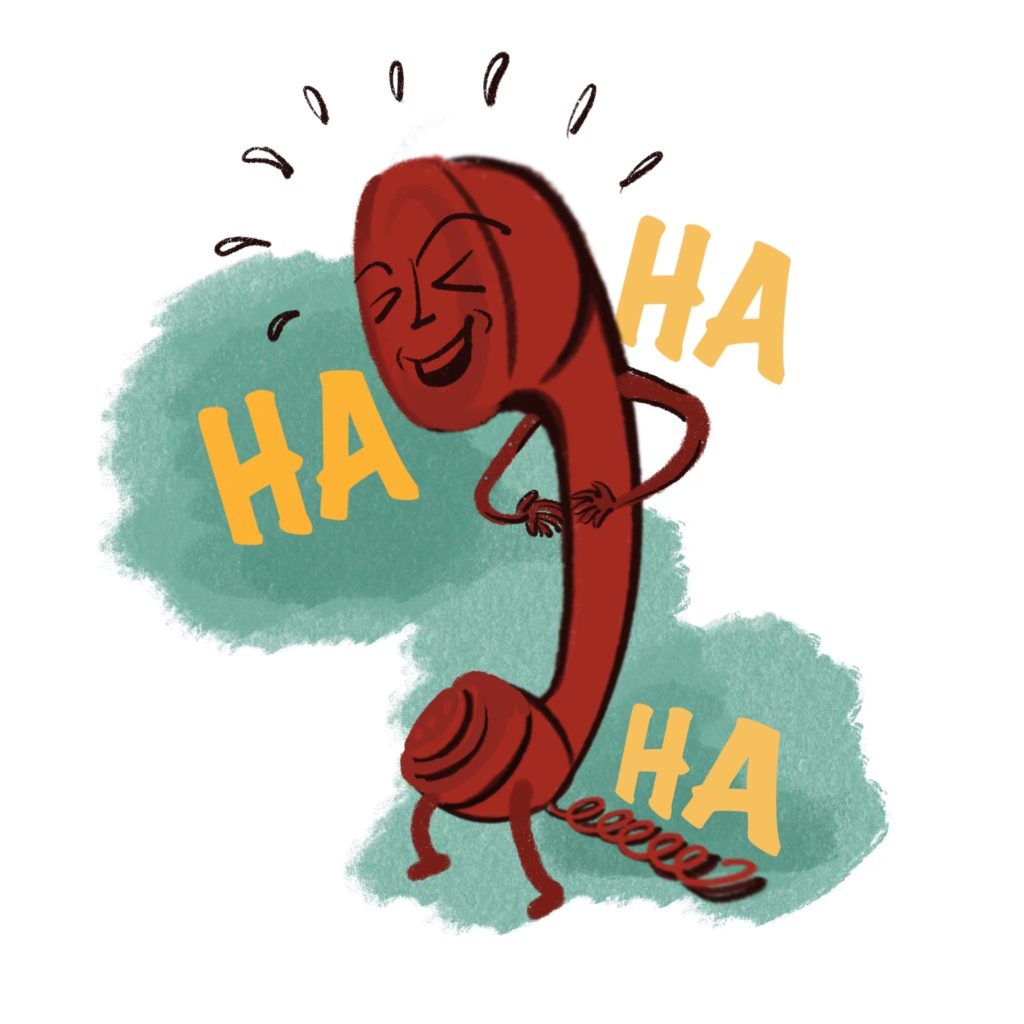
Initially I thought The Telephone Call was a straightforward take-down of consumer culture, the way we tend to measure the success of life in terms of how much money we happen to have. And in a big way it is. Adcock’s poem frames the whole of life as one big – Universal – lottery: some people ‘win’ and get to live as filthy rich millionaires . The rest of us look on, perhaps with a touch of envy, wondering what life would be like if we could enjoy some of that wealth. The company rep’s description of life if you’re rich touches on this theme as well. He says, with a condescending laugh: ‘not that it makes a lot of difference once you’re a millionaire.’ In this scenario, life is a zero-sum-game. Some people are winners and everyone else, by definition, is a loser. It’s a binary trap – but one that even those of us who say we don’t care about money fall into occasionally, especially when offered the chance to join the ‘winning’ side. The poem’s dialogue form is so recognisable that it encourages us to put ourselves in the ‘winning’ position, and reading it prompted me to wonder how I might act if I am ever told I will receive such an unexpected windfall. However, if you follow the poem through to its end, Adcock reveals that, if you think about life from the point of view of experiences rather than money, we’re all winners – anybody reading these words is lucky enough to have already won the metaphorical prize of life. The poem’s unusual premise – the offering up of a million before snatching it away at the last moment – simply reminds us to keep a healthy perspective when it comes to money matters. Plenty of exciting things happen every day; winning the lottery is just an extreme and unlikely example.
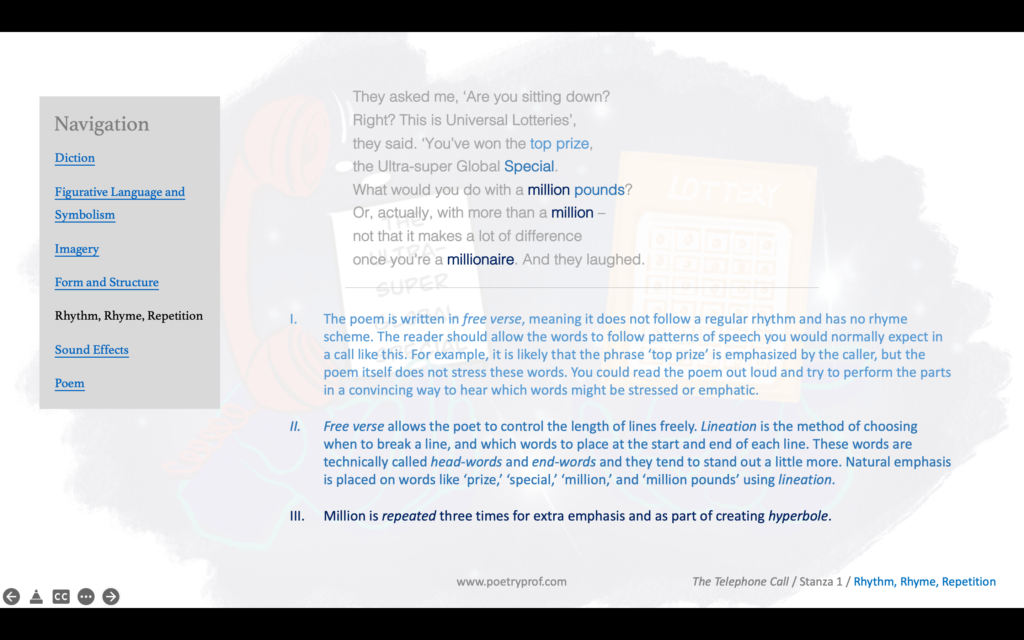
The word-for-word transcription of the dialogue between the representative of a mysterious lottery company and the supposed winner of the lottery is the most unique aspect of the poem, even including speech marks and speech tags ( I said … they said … and so on) to help the reader keep track of who is speaking when. Unlike dialogues written in novels or stories, Adcock doesn’t begin a new line when the voice changes from one character to the other, so occasionally things might get a little confusing. On top of this, Adcock marks some lines with frequent punctuation while letting other lines run one into another without punctuation or pause, using a technique called enjambment . Line seven running into eight, not that it makes much difference once you’re a millionaire , features a perfect example of this technique. I shouldn’t worry if you find it a little hard to follow on first reading: on one hand, each of the two characters has their own recognisable voice that you’ll get used to pretty quickly. The lottery rep uses a kind of ‘telephone marketing’ language, including words from this lexical field such as top prize, Ultra-super Global Special and our computer while the flabbergasted ‘winner’ reacts in a predictably astonished way: ‘I just… I can’t believe it.’ On the other hand, any confusion or disorientation you might feel on first read is a great way of putting yourself in the position of the person on the other end of the line, snapped out of a presumably ordinary day with news that will completely change her life.
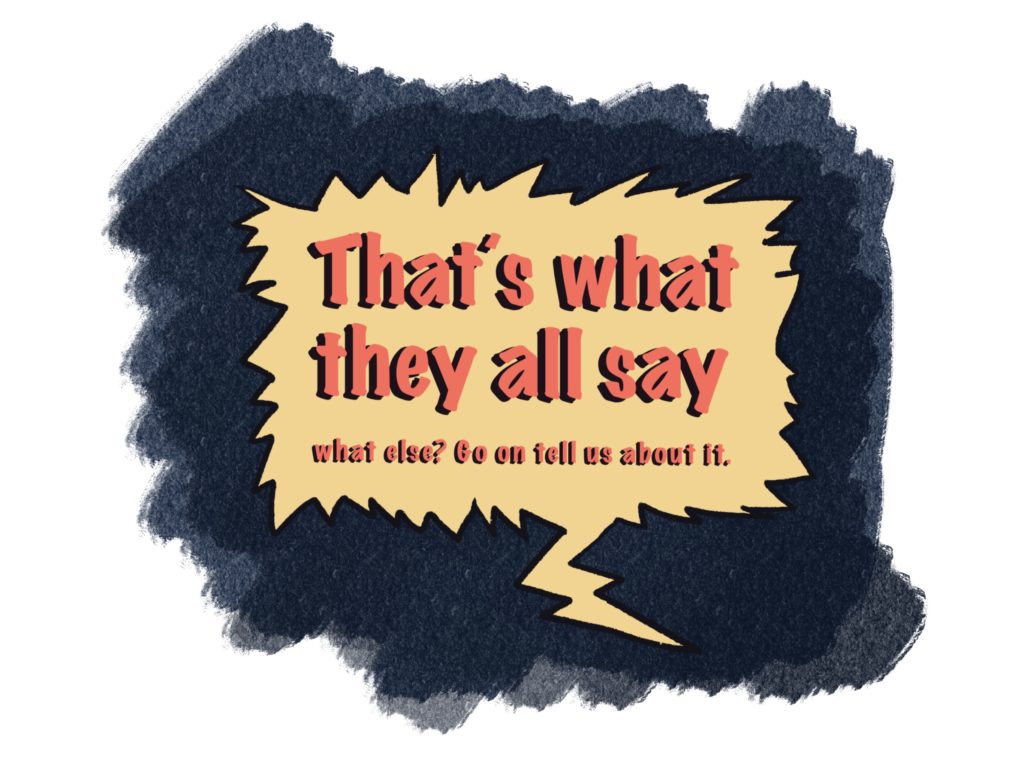
The representation of the salesperson as a formless, disembodied voice on the other end of the phone is pointed. He comes across as a mean-spirited huckster, even before the big reveal at the end. To begin with he employs copious hyperbole , which is the deliberate exaggeration of language, to overwhelm his listener and elicit the strong emotional reaction he’s presumably fishing for. Words like special , ultra-super, more than a million and top prize are prime examples of this unsubtle hyperbole . Apart from this though, his voice can be heartless and even cold: consonance and alliteration are employed as embellishments, making him sound distant and occasionally cruel. When he first speaks his tone is prim and proper, accentuated by dental T sounds ( ‘Are you si tt ing down? Righ t ? This is Universal Lo tt eries’ ) and the delivery of his startling news is emphasised by strong plosive P and B: ‘You’ve won the to p p rize, the Ultra-su p er Glo b al S p ecial.’ Of course, cordiality and enthusiasm is all part of his act so, once he’s got her snared in his trap, Adcock blends in some harsher gutturals (made with letters G and C) to give his words an unpleasant undertone; for example, ‘You’re g oing to g et a million p ounds. Rela x , now, have a li tt le c ry, we’ll g ive you a moment…’ There’s more than a touch of meaningless jargon to some of the rep’s language (I’m looking at you, retrospective Chances Module ) and he also employs one or two cliches , such as It’s not every day… and Have a nice day! as if he’s not particularly invested in what he has to say. The language he uses to describe the processes of his company – particularly his choice of verbs : bought, buy, feed, deal, operate – and the way good fortune seems to rely on the whims of a computer are indicative of the technological, transactional nature of life in the modern world. Citizens of capitalist societies, certainly, are conditioned to consider themselves ‘consumers’ first and ‘human beings’ second.
Initially, he dominates the conversation and the recipient of the call doesn’t get to speak until the second verse; even then, the balance of dialogue is always weighted towards the caller. He has all the power in this interaction; he’s the one who phones out of nowhere, sets the agenda of the call, and controls the direction of the conversation. As the poem unfolds, right up until the twist in the final stanza, the voice takes on a more pressing tone . If the whole thing really is just a cruel hoax, he milks it for all it’s worth by repeatedly asking short, sharp questions one after another, not giving his listener a moment to find her equilibrium. The way he wants to know how she feels all the time is sinister, almost vampiric, as if he’s feeding on her emotional reaction. He exhorts her to cry , says don’t be afraid of giving in to your emotions, and repeats tell us , as in this example:
Some of his lines are very choppy, fragmented with frequent punctuation making it seem like he’s slowly coaxing her in a sinister way. His nagging insistence is created using the imperative tense whereby the verb is placed at the start of the phrase ( Come on… don’t be… tell us… and so on). It suggests something macabre in his intentions; he’s forcing her to interact and relishing her discombobulation when she can’t find the right words. At other points, he’s a little condescending of her, laughing at her twice, and a dismissive sneer occasionally slips through his polished patter, such as when he says: have a little cry. Through the unpleasant characterisation of the caller, the poem implies that life can be ugly and dog-eat-dog values are hidden just below the veneer of a civil interaction.

By contrast with his cold, corporate bullying, hints of something more emotive shine through from the recipient’s side. Sneeze, tingling, and cry are all physical, tactile words, and the image of her head floating off into space is the most lively and stimulating of the whole poem. Her words come across as honest, especially when she admits that she’s overwhelmed: I think I’m going to sneeze – or cry! Adcock gives us a glimpse that, behind all the stifling, corporate babble, living breathing people still inhabit the world. While we’re looking at the reactions of the ‘lucky winner’, I’ve read one or two commentators saying the poem is about greed, or about our desire to get ‘something for nothing’ – but I’m not sure I agree with this interpretation. To begin with, the recipient of the call is flabbergasted by the news and skeptical to hear they’ve won more than a million. Her instinctive, first reaction is to express pure disbelief, ‘I just… can’t believe it ,’ and, to be honest, she never really gets beyond that reaction: almost the last thing we hear from her is ‘I’ll believe it when I see the cheque’, Adcock using repetition of the same phrase to drive home this theme. The caller lays it on thick, repeating million, million and millionaire three times in the first stanza alone, hoping to tempt her like the devil seeing if she will sell her soul. But, to her credit, she doesn’t immediately fall into his trap. She replies reluctantly, suspecting that not everything is as cut-and-dried as it appears to be. There’s a long literary tradition of poems exploring the tug-of-war between the heart and the head and the caller’s proposition pits his victim’s logical sense of disbelief against hope: I can feel the push-and-pull of temptation fighting reason throughout Adcock’s poem.
On one hand she’d love to have such a large sum of money drop in her lap out of nowhere. On the other hand – it all seems too good to be true and her logical sense just about holds her emotions in check so she never runs away with herself. In verse four, just as hope seems to have won over disbelief, she pulls herself back from the edge with a sudden ‘Hang on!’ before restating her concerns about this whole unbelievable conversation. In verse five, when pressed, she uses vague language such as incredible and marvellous to describe her emotions, words that contrast with her need to see something more concrete as proof: she says I haven’t bought a lottery ticket and asks to see the cheque , both of which are physical representations of the money she’s been promised. The simile she uses to describe her incredulous feelings ( revolving like a flying saucer ) associates with disbelief too – flying saucers are always discredited when it turns out they were just weather-balloons or something mundane. If you’re being uncharitable, you might say the news has made her a little grasping and she does eventually ask ‘But what about the money?’ Still, it’s worth debating here who planted the idea in her mind in the first place – would she crave it if she hadn’t been promised it? I think the pattern of her reactions follows the way disbelief slowly turns to hope and I don’t think we should hold it against her that, while she finds it hard to accept her good fortune, later she wants to take advantage of it, against her better judgement perhaps.
To be honest, this poem is all about the ending either way. The last verse is genius, twisting everything you’ve read upside down, and making you realise that the phone conversation you’ve been following is something completely different to what you thought it was. The way the company rep replies to her final question ( ‘Oh… we don’t deal in money’ ) is a weighted reminder that, no matter how much we might think about money , the ‘meaning of life’ is much more than counting pennies. While we often get caught up in the rat race, measuring the worth of our existence through financial success, we forget that life is for having a great experience… something you’ll remember. As the famous saying goes: ‘ after all, you can’t take it with you .’ A lot depends on his tone when he says : That’s your prize . Is he harshly crushing her hopes – or is there a touch of sincerity in his voice? If the prize is life, then we’re all winners anyway. It’s up to you to respond to his revelation in your own way: Do you think the caller has been cruelly twisting the knife, relishing her discomfort and feeding off her emotional responses? Or do you believe his purpose was not really to prank her, but to deliver an important reminder about life’s priorities before it’s too late?

For me, bubbling away beneath the surface is the nagging impression that the telephone call is actually the last thing anybody hears before passing from this world into the next. There are frequent hints that the caller is more like a supernatural or otherworldly being than a real person: for starters, his or her identity is hidden behind the plural they and whoever he or she really is, they seem much more powerful than they have any right to be: the idea of a Universal Lottery for which you don’t have to buy a ticket suggests the lottery is a direct metaphor for life – and the caller’s in charge! His retrospective chances module implies he’s a force of fate and the whims of his computer have the power to change the course of a person’s life. Little words scattered throughout the poem can be pieced together like a puzzle: he says everybody’s bought a ticket once and when he says that’s what they all say I wonder if he literally means everybody! Lineation (the choice of which words to begin and end a line) plays a part in this interpretation: dead is the last word of the poem. You might argue the line went dead simply refers to the metaphorical death of her hopes for scooping the jackpot – but it may suggest something more permanent is about to happen at the same time! Her physical symptoms – dry throat, tingling, crying – can be transposed into this scenario too, should you have a mind to read the poem metaphysically. When the call’s recipient admits I feel the top of my head has floated off, out through the window … the image resembles the way a soul is commonly depicted leaving the body and ascends to heaven.
It’s up to you, and if you don’t agree with the ‘voice of God’ theory – no problem. The poem works as a hoax call, an expose of corporate creep , and a reminder to set our priorities straight when it comes to money just as well. The poem implies that reassessing our outlook on why we’re all here is something we might like to do sooner rather than later, especially if you believe that one day we’re all going to get a call from Universal Lotteries. In Ancient Greek mythology, Charon’s duty was to ferry deceased souls across the River Styx into the underworld. But he is far from unique. Christianity has St Peter guarding the pearly gates of heaven and deciding who goes through and who doesn’t. Ancient Egyptian culture gives us Osiris , who would meet departed souls in the Hall of Judgement, where they would plead entry to the underworld. Japanese folklore features Izanami , the creator of the islands of Japan and now a Goddess of death. The list goes on. Is Adcock’s poem a snappy, up-to-date re-imagining of a death-myth in disguise? In this case, the disembodied voice is like the voice of God or a threshold guardian inducting us into the afterlife; capricious, yes, as Gods sometimes are, but also reminding us of the true purpose of life. You’ve had a good experience , right? could simply be referring to this one phone call, and the rollercoaster ride of having her hopes raised then dashed so abruptly – or he could mean her entire life experience . I think both options are on the table.
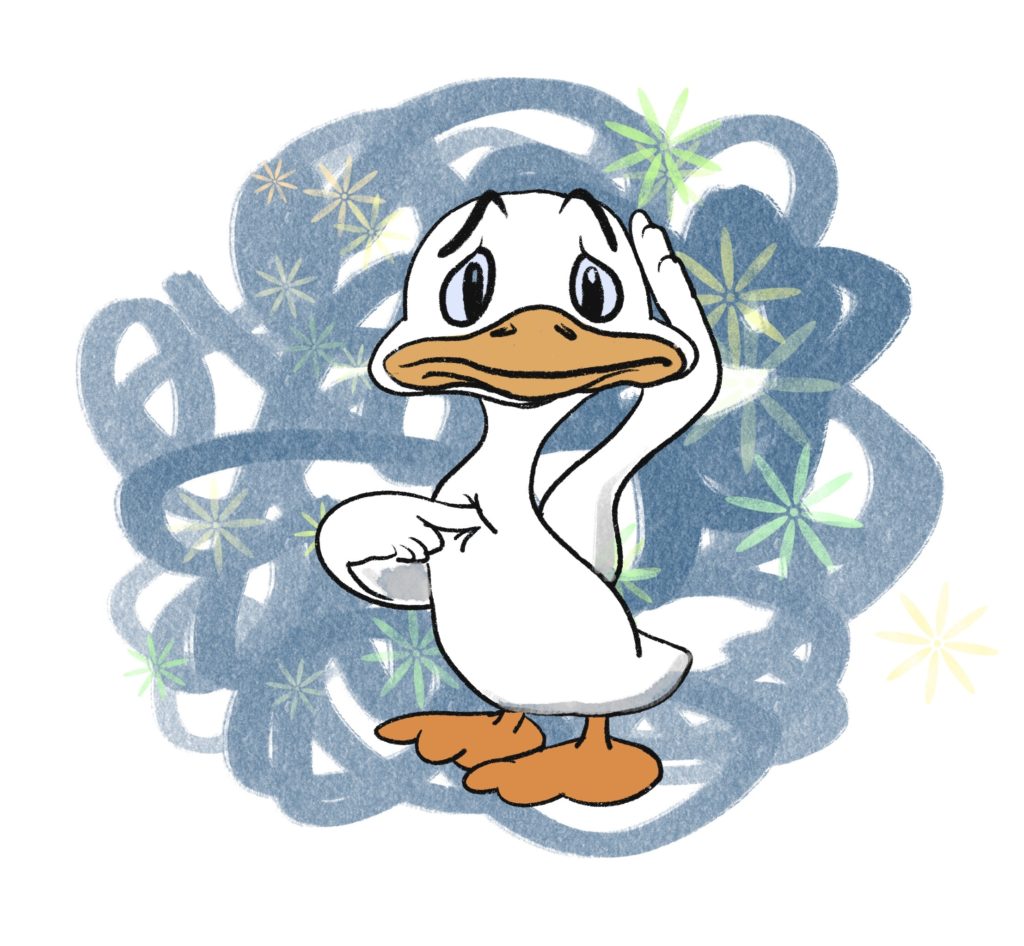

Suggested poems for comparison:
- For Heidi with Blue Hair by Fleur Adcock
A fraught telephone call is central to this poem as well, highlighting the way communication doesn’t always equal connection or understanding. When Heidi dyes her hair blue she’s sent home from school – much to the anger of her father – but her friends stand with her in a moving scene of solidarity.
- O Me! O Life! by Walt Whitman
Life isn’t always easy and we may be distracted by all kinds of things – money in Adcock’s poem, suffering in Whitman’s. At the end of the day, he too comes to the conclusion that the purpose of life is for living, nothing more.
- Children of Wealth by Elizabeth Daryush
The poem describes a child of privilege who lives life protected in her house, sealed up behind thick glass windows and insulated from the winter weather, safe and warm. Daryush urges the child to ‘Go down, go out…’ into the heart of winter and feel the cold of the snow. As Adcock would remind us, Experiences are what we deal in, right?
Additional Resources
If you are teaching or studying The Telephone Call at school or college, or if you simply enjoyed this analysis of the poem and would like to discover more, you might like to purchase our bespoke study bundle for this poem. It costs only £2 and includes:
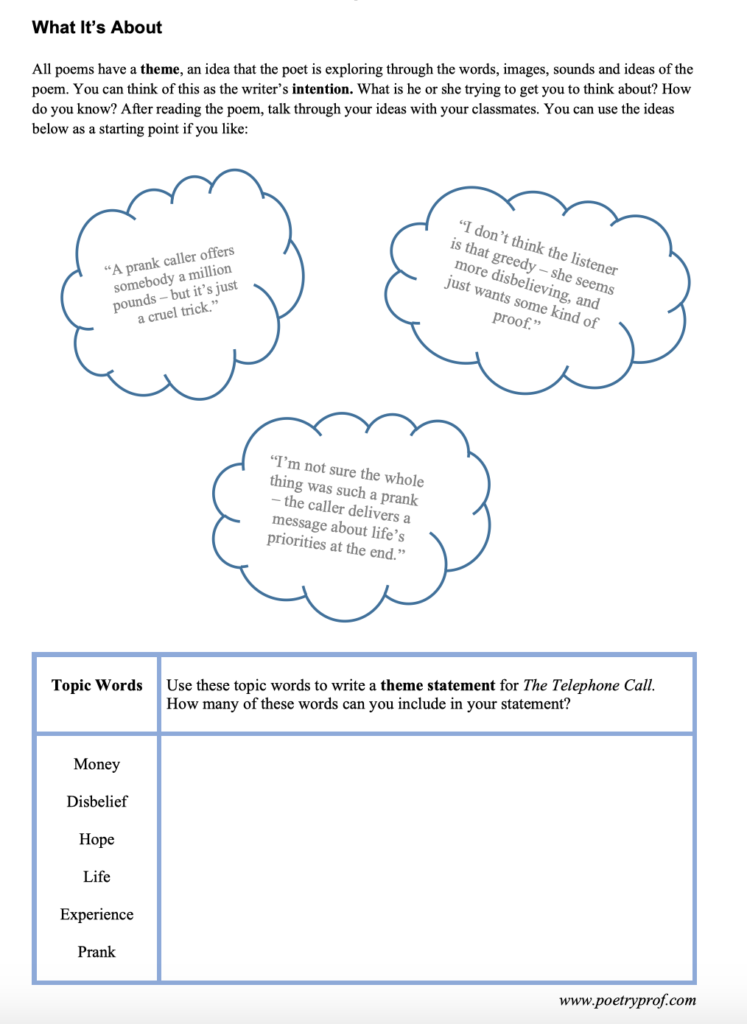
- Study Questions with guidance on how to answer in full paragraphs.
- A sample ‘Point-Evidence-Explanation-Analysis’ paragraph to model analytical essay writing.
- An interactive and editable powerpoint, giving line-by-line analysis of all the poetic and technical features of the poem.
- An in-depth worksheet with a focus on explaining the effects of enjambment , caesura and lineation in this poem.
- A fun crossword quiz, perfect for a starter activity, revision or a recap – now with answers provided separately.
- A four-page activity booklet that can be printed and folded into a handout – ideal for self study or revision.
- 4 practice Essay Questions – and one complete Model Essay for you to use as a style guide.
And… discuss!
Did you enjoy this breakdown of Adcock’s poem? Do you agree or disagree with the idea that the poem isn’t about greed? Who do you think the disembodied voice on the end of the phone really belongs to? Why not share your ideas, ask a question, or leave a comment for others to read below. For nuggets of analysis and all-new illustrations, find and follow Poetry Prof on Instagram.
The work will help me a lot with my school assignment. As a literature student, it’s good to have different types of articles, with different perspectives on poems and text
Hi Smriti –
I’m very happy you find different perspectives useful. Thank you so much for your nice comment – and best of luck with all your studies.
Leave a Reply Cancel reply
Your email address will not be published. Required fields are marked *
Notify me of follow-up comments by email.
Notify me of new posts by email.

‘The Telephone Call’ by Fleur Adcock – What is it about?

Fleur Adcock’s ‘The Telephone Call’ is a quirky poem, where the speaker receives an anonymous call that tells her she’s won the lottery! But things are not as they seem, and the poem ends with a great anticlimax. Here’s a summary of the poem!
This post gives you an insight into the core ideas of the poem, you can purchase a full study guide below to get a more detailed A* level analysis – including tasks, exercises and essay questions.
- Lottery – a type of gambling game in which people buy numbered tickets. Several numbers are then chosen, and the people who have those numbers on their tickets with a prize
- Float off – to fly slowly away in the air, or to bob away in the water
- Flyer saucer – a round, flat object which some people say they have seen flying in the sky and which they believe to be a spacecraft from another planet
- Tingle – when a part of your body tingles, you have a slight stinging feeling there – it is also the sensation that we get from ‘pins and needles’, when blood is temporarily cut off from a limb through pressure and then quickly comes flooding back
- Cheque – a printed form on which you write an amount of money and who it is to be paid to. Your bank then pays the money to that person from your account
- Deal in – the primary purpose or product of a business
STORY/SUMMARY
In the first four lines the speaker, who is probably the poet Fleur Adcock herself, introduces the subject matter. She received a call from the “Universal Lotteries” as she won the top prize in the “Ultra-super Global Special” lucky draw. The person on the call asks the poet what she would do with a million or more than a million pounds and they sarcastically add, “not that it makes a lot of difference/once you’re a millionaire.” Then they laugh. So, from this stanza, the author gives a hint that she didn’t win any prize at all. They are just mocking her innocence.
In the second stanza, they ask the poet whether she feels well and if she is still on the phone, and they ask her to share her emotions. She says she is incredulous, but they tell her that everyone reacts this way and urge her to continue. Then she says she feels dizzy as if ‘the top of her head/has floated off, out through the window, revolving like a flying saucer.’
Read the full poem here: https://genius.com/Fleur-adcock-the-telephone-call-annotated
They notice that it is a strange sensation and ask the poet to continue. She says that she feels suffocated, that her mouth is dry and her nose itches as if she were about to sneeze or burst into tears. She is immediately reassured that she should not be ashamed to show her feelings; after all, it is rare to hear that one is about to become a millionaire.
They urge her to let her tears flow for a minute. But the speaker tells them to wait, objects that she has not participated in a lottery in years, and skeptically asks them to repeat the name of their organisation. Amused, they tell her that it does not matter that she has not participated in a lottery recently. The name of their organisation is ‘Universal’ and they use ‘a retrospective Chances Module.’
They explain the function of this module: most people have participated in a lottery at one time or another, and they are all eligible to receive Universal Chance’s prize because this organisation buys all past lottery entries and uses a computer program to draw a winner. The poet expresses amazement, but says she will not fully believe her good fortune until she receives the prize cheque.
When the poet asks about the prize money, Universal says that their lottery does not distribute money, but ‘Experiences’, therefore she is eligible to receive an incredible, exciting, and memorable experience. They congratulate the poet, say hello, and the line drops.
SPEAKER/VOICE
The speaker uses a conversational style to anecdotally recount her experience with the telephone call. It is set up initially as a kind of cold-call situation, where she is contacted randomly by an organisation who have a specific agenda. This telephone conversation seems to have a certain importance in the speaker’s life. It may have changed her perspective on life, or it has been a memorable and shocking moment. In any case, the simplicity of the poem and the use of humour make one read the poem to the end, where a twist awaits readers. From the title itself, it is clear that the author deliberately chose the use of the definite article ‘the’ instead of the indefinite article ‘an’ before ‘telephone’ to underscore its importance.
Thanks for reading! You can buy our detailed A* study guide here if you’re studying this particular poem.
This includes:
Vocabulary Story + Summary Speaker + Voice Language Feature Analysis Form + Structure Analysis Context Attitudes + Messages Themes + Deeper Ideas Key Quotations Extra Tasks Comprehension Exercises Essay questions

Related Posts

The Theme of Morality in To Kill A Mockingbird

To Kill A Mockingbird Essay Writing – PEE Breakdown

Emily Dickinson A Level Exam Questions

Unseen Poetry Exam Practice: The Man He Killed

Poem Analysis: Sonnet 116 by William Shakespeare

An Inspector Calls – Official AQA Exam Questions

The Dolls House by Katherine Mansfield: Summary + Analysis

An Occurrence At Owl Creek Bridge: Stories of Ourselves:

Robert Frost’s Life and Poetic Career

Edexcel IGCSE Poetry Anthology List
© Copyright Scrbbly 2022

The Telephone Call Poem by Fleur Adcock Summary, Notes and Line by Line Explanation in English for Students
Table of Contents
Introduction
Fleur Adcock’s “The Telephone Call” describes a phone call between the “Universal Lotteries” and the poetic ego. It is obvious from the title alone that there is a purpose to using “the” before “telephone conversation” rather than “a.” The poet’s life is somewhat affected by this conversation. It was a pivotal time in her life, or it might have transformed her.
About the Poet
Adcock was an important translator, editor, and commentator in the literary world in addition to being a prolific poet. She edited esteemed anthologies such as “The Oxford Book of Contemporary New Zealand Poetry,” translated poetry from modern Romanian and medieval Latin, and provided commentary on poetry to the BBC. Adcock won multiple awards during her career, including the coveted New Zealand Order of Merit, the Queen’s Gold Medal for Poetry, and an OBE for her literary services.
Fleur Adcock’s poem “The Telephone Call” is divided into six stanzas, each with eight lines.
The first four lines of Fleur Adcock’s poem “The Telephone Call” introduce the topic. When the poet won the top reward in the “Ultra-super Global Special” lucky draw, the “Universal Lotteries” called her. They questioned the poet in the final four lines on what she would do if she had a million pounds or more. They sarcastically continued, “Not that it makes a lot of difference/once you’re a millionaire,” after stating that. After that, they chuckled. Thus, the poet suggests in this passage that she was not awarded any prizes at all. They were merely making fun of her naivety.
Fleur Adcock’s poem “The Telephone Call” begins to reveal the poem’s core themes in the second stanza. The poem’s first lines touch on the issue of appearance versus reality. The poet has a mental argument over reality vs the fantasy of winning a million pounds. The news, in some way, made its way into her subconscious and roused the restless, irascible child named greed dossing in her heart. She felt as though her brain had floated out the window and she lost all sensations. She uses an image of a flying saucer to convey her state.
The poet’s baser feelings begin to take control of her logical thoughts in the third stanza of “The Telephone Call.” She struggled to communicate in any way. Her heart burned so much that her throat dried up. She felt so exposed by the seeming truth that she started to cry. The topic of erratic human emotions is covered in this section. After that, the employee of the company challenged her ability to exercise self-control and pushed her to let her feelings take over. They intended to show her the ultimate in chimeric euphoria for imparting a lesson that would change her life.
The poet begins to emerge from her hallucination in ‘The Telephone Call’, specifically in the fourth stanza. She told them she hadn’t purchased a lotto ticket in a few years. After hearing the response, they once more laughed at the poet. They told her that since they had a “retrospective Chances Module,” she didn’t need to worry about getting a ticket. The mention of the module, nevertheless, would have cast doubt on their veracity. The caller was aware of that. In the following section, the person gives the poet a description of the procedure.
Fleur Adcock’s poem “The Telephone Call” describes the process by which winners were chosen by Universal Lotteries. The poet illustrates here how people rely on luck instead of manipulating it to their advantage. For this reason, almost everyone buys a lottery ticket to try their luck at some point in their lives. The business referenced in the poem purchased previous lottery files from other businesses and input the information into their computer to have a lucky draw. The name of the poet was revealed in the artwork. However, the poet is rapidly getting over her delusion. She informed them she would believe it when she saw the bill because of this.
Fleur Adcock’s poem “The Telephone Call” fractures the final pillar of the poet’s greed in its intriguing final stanza. They retorted that they didn’t trade in currency or similar items. Their dealings were with “experiences.” This section explains how priceless experiences are far more valuable than material possessions. And for that, she would always be grateful for her award. They then hung up the phone after congratulating the poet. Aside from that, the final line’s usage of the word “dead” illustrates how her irrational fascination crumbled in a matter of seconds. Moreover, the phrase “don’t deal” contains alliteration.
The speaker in “The Telephone Call” gets a phone call that changes their entire life: they’ve won the lotto! They imagine a completely other existence, complete with a spacious new home, lavish vacations, and no more money concerns, all in a flurry of enthusiasm. They inform their relatives of the news, daydream about exotic islands, and even the ordinary chores of everyday life appear insignificant at that moment.
But among the excitement, uncertainties and fears begin to surface. The call’s suspicious-seeming source is vague. The riches that have been promised seem unreal, perhaps too good to be true. The dream ends just as abruptly as it started. The “winning numbers” are oddly absent and the speaker is left hanging when the call ends. A deeper-than-expected sense of disappointment descends upon learning of the hoax.
The poem explores more than just foolish financial decisions. It’s a critique of the transience of optimism and the seduction of rapid satisfaction. We watch the speaker change from being realistic and satisfied at first to having fanciful ideas that are fed by material abundance. More than simply money is lost—it’s a fantasy broken and a face-palm encounter with everyday life.
However, in the wake, acceptance becomes apparent. The speaker recognizes that worldly items are not the source of happiness and that wants are ephemeral. The poem ends with a thought-provoking line, “the dial tone hummed, insistent, in a world / where nothing much had changed, except perhaps / a grain of doubt, a flicker of unease.” The poem’s main idea is summed up in this last line: life’s unexpected turns present chances for introspection and development, which deepens our awareness of who we are and what we stand for.
“The Telephone Call” explores more than simply a misplaced fortune; it also explores the human condition, our never-ending dance between optimism and pessimism, and the pursuit of fulfillment and meaning in an illusion-filled world.
Related Posts:
- Lady Lazarus Poem Summary, Notes And Line By Line Analysis In English By Sylvia Plath
- The Woman Poem by Kristina Rungano Summary, Notes and Line by Line Explanation in English for Students
- Common Conversational Phrases in English [List of 939]
- Sweeney Among the Nightingales by T. S. Eliot Poem Summary Notes and Line by Line Explanation in English for Students
- Ariel Poem by Sylvia Path Summary, Notes and Line by Line Explanation in English
- Sonnet 130 by William Shakespeare Summary, Notes and Line by Line Explanation in English
- Arts & Humanities
`The Telephone Call` by Fleur Adcock
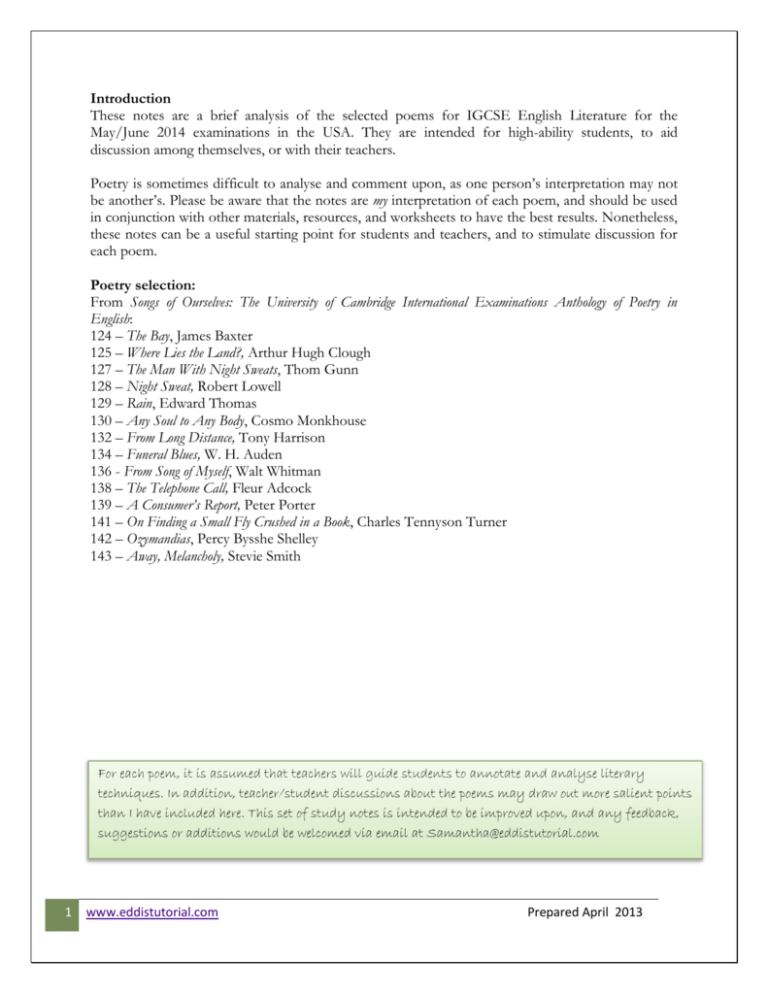
Related documents

Study collections
Add this document to collection(s).
You can add this document to your study collection(s)
Add this document to saved
You can add this document to your saved list
Suggest us how to improve StudyLib
(For complaints, use another form )
Input it if you want to receive answer
- International
- Schools directory
- Resources Jobs Schools directory News Search

The Telephone Call by Fleur Adcock - Full Lesson - CIE Poetry iGCSE 2023-25
Subject: English
Age range: 14-16
Resource type: Lesson (complete)
Last updated
9 April 2024
- Share through email
- Share through twitter
- Share through linkedin
- Share through facebook
- Share through pinterest

In this 20-slide PowerPoint presentation you will find: about the author, breaking down the title, a dramatic reading activity, 5 thought-provoking/annotation questions on each stanza, tasks on theme, tone, structure and the author’s message; and finally a short creative-writing activity. It will require at least one full hour of teaching but could easily be amended. If you take the writing activity further, it might be better spread over two lessons. Hopefully this PP will be of use in preparing your students for their iGCSE exams, or beneficial to anyone studying this poem. Any feedback is always appreciated.
Tes paid licence How can I reuse this?
Get this resource as part of a bundle and save up to 60%
A bundle is a package of resources grouped together to teach a particular topic, or a series of lessons, in one place.
Songs of Ourselves - Volume 1 Part 4 - CIE 2023-25 - All Poems Analysed
Here you will find a detailed PowerPoint presentation for every single poem in the new iGCSE syllabus. In addition, there is a selection of 1000-word model essays responding to a variety of the poems to share with students. In other lessons, there are model paragraphs, colour-coded for clarity. Some of the poems have a supplementary YouTube video where I have broken down the poems for students to revise at home (more videos to come soon). The lessons have a very wide range of activities to engage students, and most poems have either line by line questions or line by line annotations (or both). This is all you need to be prepared to teach these 15 poems. I have also included a 16th poem (The Bay) that could be used as an "unseen" exam example. I have also made a full anthology for easy printing. Poems covered here are: 1. The City Planners 2. The Planners 3. The Man With Night Sweats 4. Night Sweat 5. Rain 6. The Spirit Is Too Blunt An Instrument 7. From Long Distance 8. Funeral Blues 9. He Never Expected Much 10. The Telephone Call 11. A Consumer's Report 12. Request To A Year 13. On Finding A Small Fly Crushed In A Book 14. Ozymandias 15. Away, Melancholy 16. Bonus Poem (The Bay) 17. Full Printable Anthology (PDF)
Your rating is required to reflect your happiness.
It's good to leave some feedback.
Something went wrong, please try again later.
Avrilwellwood
Good PowerPoint with appropriate points/questions per stanza to aid reflection. It would have been nice if there had been some annotations / analysis included.
Empty reply does not make any sense for the end user
Awesome SOW, excellent annotations and saved me a lot of time as a first time teacher of CIE! Thank you!
jan_chadwick
This is a great resource. Saved me an awful lot of time.
Clear, comprehensive and classroom ready. Excellent resource which can be used immediately or adapted into your own lessons. After this difficult year I do not have the time nor energy to prep all this before next term. This has saved me a ton of stress.
Report this resource to let us know if it violates our terms and conditions. Our customer service team will review your report and will be in touch.
Not quite what you were looking for? Search by keyword to find the right resource:
On a mission to end educational inequality for young people everywhere.
ZNotes Education Limited is incorporated and registered in England and Wales, under Registration number: 12520980 whose Registered office is at: Docklands Lodge Business Centre, 244 Poplar High Street, London, E14 0BB. “ZNotes” and the ZNotes logo are trademarks of ZNotes Education Limited (registration UK00003478331).
“Telephone Conversation” by Nobel Essay
Introduction, humour as a sympathetic tool, works cited.
The poem “Telephone conversation” is written by Nobel laureate winner professor Wole Soyinka. In this poem, the writer describes the conversation that ensued between him and a racist British landlady when he tried to rent her apartment. Poetry usually seeks to teach or reveal to us the beauties and ugliness of life and the world entirely. In the poem “telephone conversation”, the writer uses humour to deflate as well as to intensify the pain he endures as a result of racial prejudices. (Mahone, 152)
This poetic essay will analyze the entire poem and discuss the function or role of humour as a sympathetic tool in the poem “telephone conversation”. Furthermore, the writer’s ingenious sense of humour which enabled him to deflate the pain he experienced as an African in Britain will be constructively analyzed. Lastly, the uncivil attitude of judging people based on their color will also be discussed.
“Telephone conversation” is about the writer’s experience with a racist landlady in Britain. The writer as an African wishes to rent an apartment which he finds comfortable to him. He describes the apartment’s price as reasonable but feels indifferent about its location. (Charles, 267) Been contented with the price and location of the property, the writer decides to call the landlady to discuss amenities, price and other issues relevant to the apartment. However, the writer is aware of the racial prejudices against Africans and decides to boldly face the issue and probably get it out of the way permanently. This prompts him to confess his race instead of explaining it. Africans were usually treated as if their race or color was a crime or their fault. The landlady proved this fact beyond reasonable doubt as she immediately reacted by been silent after listening to his confession. When she eventually spoke, she bluntly asked “HOW DARK?” (Wole, 344) The use of capital letters by the writer clearly shows the writers pain to her demeaning and cold attitude when she learnt he was African. Here, the writer uses humour as a sympathetic tool to console himself as he mockingly describes the landlady in the context of a civilized, wealthy and well bred woman with good morals and values. Although in reality, she lacked every sound moral attitude to qualify her as a well bred woman. Her voice after the awkward silence is described as lipstick coated, cigarette holder pipped and long gold rolled. (Charles, 285) This description fits a lady of substance in all ramifications but the landlady was by no means a woman with sound attitude judging by the way she enquired about his race. (Mahone, 143)
Dumbfounded by the landlady’s arrogant reply, the writer is silent and she pushes on about her inquiry by rephrasing her question and asking again. “ARE YOU LIGHT OR VERY DARK?” (Wole, 312) The writer again humorously uses sarcasm to express how he feels as he says, “Shamed by ill mannered silence”. (Wole, 354) At a first glance without comprehending the poem, a reader might believe the writer is shamed by his own silence as a result of his inability to answer the landlady’s question. However, this is only a way of mocking the landlady’s attitude. The writer’s true intent is to show the reader that the landlady was shameless from the way she kept pushing about the issue of race completely ignoring every other detail. The writer had no reason to be ashamed when it was very obvious that the landlady was the ill mannered of the two. (Charles, 123)
It is very glaring that the landlady has no sense of decency and she proves this as she continually pressed the writer to describe his skin color. The theme of the entire poem is to prove that, been a better person does not count on been African or British. The landlady who is of British origin tries to treat the writer who is of African roots as a lower being yet he outwits her. (Charles, 321) When the landlady again presses about the writer’s color, the writer decides to use higher vocabulary to describe himself. He told the landlady that he was “west African Sepia” (Wole, 376) knowing that the landlady was oblivious to such grammatical expression. This gets the British landlady confused as she had expected a simple black or white answer from him. But the writer instead of been the savage the landlady had expected him to be due to his race, he sarcastically continues to describe himself in a simple and sophisticated manner which leaves the landlady completely lost and dumbfounded. The writer’s answer and ability to confuse the landlady creates a humorous irony. The British landlady addressed the African caller as a lower being by bluntly asking him how dark he was. But the highly intelligent African writer not only proved her wrong by outwitting her but he also leaves a question on the mind of the readers. The ability of an African man to outwit a British woman and make her seem foolish using English language which is her native language, questions the irony of judging people based on their race or color. The writer describes his face as been brunette, his palm and sole of his feet as peroxide blond. His bottom he says is raven black from the friction of sitting down. At this point the landlady was completely lost and she hung up before he could describe the color of his ears. Wouldn’t you rather see for yourself? He asked the into the empty telephone line. (Wole, 213)
The poem “telephone conversation” serves as a deterrent to anybody who deliberately intends to ridicule other people simply for the sake of their skin color or race. Situations like this have the potential tendency to explode the conversation into a full verbal war. But the writer is highly intelligent and well cultured so, he resorts the use of humor to ridicule the supposedly superior British landlady and deflate his own pain. The theme of the whole poem focuses on the negativity in judging people based on race. If race was a criterion for intelligence, the British landlady would have outwitted the African caller who intended to rent her apartment. (Mahone, 405) “Telephone conversation”, is a short comic poem. This can be seen right from the first verse of the poem when the African caller humorously described the British landlady as having good breeding regardless of her single mindedness and awkward silence when she learnt he was African. The most significant aspect of the poem is the writer’s ability to use humour as a sympathetic tool to console himself from the pain he experienced as a result of his skin color. Furthermore, the writer is highly intelligent and shows this in the manner which he uses wit to reply the landlady. (Mahone, 397) At the end of the poem, any reader that understands the poem will see that the discrepancy about what really is and what appears to be is constructively dealt with. The writer concludes the poem with an appeal to the reader’s conscience and a plea to the landlady’s sense of decency by asking, “wouldn’t you rather see for yourself?” (Wole, 143)
Charles, Wayne. Works and biography of Nobel laureate winners: A critical analysis. Boston: Houghton, 2002. Print.
Mahone, Bradley. Myth, Literature, and the African World: The Writer in a Modern African State. New York: Blackwell, 2005. Print.
Wole, Soyinka. “Telephone conversation”: Reading and writing from literature. Boston: Houghton Mifflin. 2001. Print.
- Chicago (A-D)
- Chicago (N-B)
IvyPanda. (2022, January 7). "Telephone Conversation" by Nobel. https://ivypanda.com/essays/telephone-conversation-by-nobel/
""Telephone Conversation" by Nobel." IvyPanda , 7 Jan. 2022, ivypanda.com/essays/telephone-conversation-by-nobel/.
IvyPanda . (2022) '"Telephone Conversation" by Nobel'. 7 January.
IvyPanda . 2022. ""Telephone Conversation" by Nobel." January 7, 2022. https://ivypanda.com/essays/telephone-conversation-by-nobel/.
1. IvyPanda . ""Telephone Conversation" by Nobel." January 7, 2022. https://ivypanda.com/essays/telephone-conversation-by-nobel/.
Bibliography
IvyPanda . ""Telephone Conversation" by Nobel." January 7, 2022. https://ivypanda.com/essays/telephone-conversation-by-nobel/.
- Atwood's "Dancing Girls" and Achebe's "The Madman"
- "Goodbye to Berlin" by Christopher Isherwood
- Mansfield's, Hardy's, Collins' Prose Analysis
- Reading More Than Words: Katherine Schreiber’s “Poison People”
- Counselling and Psychotherapy: The Role of Humour
- Humour and Jokes: What's So Funny?
- Jewish Holocaust and the Humour During the Dark Times
- Tennessee Williams' "The Glass Menagerie" and Critique
- Alfred Nobel as an Explosives Inventor
- Correlation Study of the Relationship Between Individual Resilience, Hope, Stress and Humour
- Dante’s Poem “The Divine Comedy ”
- The Poem 'Song of Myself' by Whitman
- Works on Life in America by Morales and Anzaldua
- Relationship Between Language and Content in Poetry
- “Inferno” by Dante Alighieri: Is Dante a Good Student or Not

IMAGES
VIDEO
COMMENTS
It describes a mysterious phone call from "Universal Lotteries," an organization claiming that the speaker has won their grand prize. When the callers finally admit the speaker hasn't won any money, they claim the true "prize" was the memorable "experience" of the call itself. The poem can be read as a miniature fable about ordinary ...
CIE IGCSE Poetry Essay Questions 2023-2025, Part 1. Essay Questions: What do you think is the speaker's attitude towards life in the poem 'A Consumer's Report'? Support your answers with evidence from the poem. ... In the poem 'The Telephone Call,' how does Fleur Adcock's writing make the poem both amusing and serious at the same ...
Answer: The name of the caller's company is 'Universal Lotteries'. Question 2: What news does the caller give? Answer: The caller gave the news that the speaker has won the top prize in the Ultra-super Global Special. Question 3: Read and answer the questions: I said, 'I just …. I can't believe it.'.
Poem Analyzed by Sudip Das Gupta. 'The Telephone Call' by Fleur Adcock is about a telephone conversation between the poetic persona and the "Universal Lotteries". From the title itself, it becomes clear that using "the" instead of "a" before "telephone conversation" has a meaning behind it. This conversation has some ...
A fraught telephone call is central to this poem as well, highlighting the way communication doesn't always equal connection or understanding. When Heidi dyes her hair blue she's sent home from school - much to the anger of her father - but her friends stand with her in a moving scene of solidarity. ... 4 practice Essay Questions ...
Go on, tell us about it.'. revolving like a flying saucer.'. ' That's unusual ' they said. 'Go on.'. I said 'I'm finding it hard to talk. My throat's gone dry, my nose is ...
Terms in this set (16) use of dialogue. - moves the narrative forwards. - outlines the characters and personalities of the speakers. "are you sitting down" - line one. - rhetorical question; creates suspense and anticipation. - second person immerses the reader, making it feel as though they, too, are receiving the call.
Expert Answers. In "The Telephone Call," Fleur Adcock's writing makes the poem serious and amusing at the same time by juxtaposing the absurd with the realistic to explore the nature of hope. The ...
SPEAKER/VOICE. The speaker uses a conversational style to anecdotally recount her experience with the telephone call. It is set up initially as a kind of cold-call situation, where she is contacted randomly by an organisation who have a specific agenda. This telephone conversation seems to have a certain importance in the speaker's life.
pptx, 12.13 MB. A full study guide for the poem 'The Telephone Call' by Fleur Adcock - perfect for teaching and revision! Suitable for students of all levels, including those studying the 2023-2025 CAIE / Cambridge IGCSE and O Level Poetry Anthology (Songs of Ourselves, Volume 1, Part 4). This digital pdf, printable pdf, PowerPoint (ppt ...
summary. post modern poem depicts how a phone call manipulates emotions, the lottery person was a catalyst, satirical commentary on the greedy nature of humans. themes. manipulation, mundane, greed, luck, expectation and dissapointment. lottery metaphor. a metaphor for life. meter. none. rhyme scheme.
The poem explores a speakers sudden excitement and surprise followed by her confusion and finally disapointment as she recieves a fake phone call about winning the lottery this mirrors the pattern of life (youthful naivity --> greed --> realisation) this mirrors the pattern of life (youthful naivity --> greed --> realisation)
Fleur Adcock's poem "The Telephone Call" begins to reveal the poem's core themes in the second stanza. The poem's first lines touch on the issue of appearance versus reality. The poet has a mental argument over reality vs the fantasy of winning a million pounds.
The Telephone Call - Fleur Adcock. Subject: English. Age range: 14-16. Resource type: Lesson (complete) File previews. pptx, 2.6 MB. Two lessons with activities and analysis of the poem The Telephone Call. Includes a detailed explanation of themes and language. Model paragraph in answer to an essay question included and scaffolding for students ...
The poem was one in which Gunn tried to 'show people what it's like to be. something else'2. Structure and Language. The poem has a well-defined structure through most of the eight stanzas, with a pattern of a 4-lined. stanza (quartet) followed by a 2-lined stanza and then a 4-lined stanza and so on.
Songs of Ourselves - Volume 1 Part 4 - CIE 2023-25 - All Poems Analysed. Here you will find a detailed PowerPoint presentation for every single poem in the new iGCSE syllabus. In addition, there is a selection of 1000-word model essays responding to a variety of the poems to share with students.
The Telephone Call. They asked me 'Are you sitting down? Right? This is Universal Lotteries,' they said. 'You've won the top prize, the Ultra-super Global Special. What would you do with a million pounds? Or, actually, with more than a million— not that it makes a lot of difference once you're a millionaire.' And they laughed.
Subjects. Best free resources for CAIE IGCSE Literature In English 0475 Poetry 2023 List including summarized notes, topical and past paper walk through videos by top students.
The Telephone Call (By Fleur Adcock) sample essay of a student - ( do not plagiarize) read and write in your own words. Background Fleur Adcock was born in Papakura, New Zealand in 1934. She moved with her family to England during World War II and then went back to New Zealand when she was thirteen. She later returned to England in 1963. Adcock did her degree in Classics, has worked as a ...
Wole Soyinka's 'Telephone Conversation' is a lyric poem written in free verse. The poem is a dialogue involving a black man and a white woman. The two are indulged in a phone call throughout the poem. The poem, to a considerable extent, follows the question and answer pattern. That is, the white landlady fires away one question after ...
The chief characters mentioned in Dorothy Parker 's short story, "The Telephone Call" are the narrator, her love interest, and God. The narrator --. Bordering on the neurotic, the narrator is ...
Introduction. The poem "Telephone conversation" is written by Nobel laureate winner professor Wole Soyinka. In this poem, the writer describes the conversation that ensued between him and a racist British landlady when he tried to rent her apartment. Poetry usually seeks to teach or reveal to us the beauties and ugliness of life and the ...